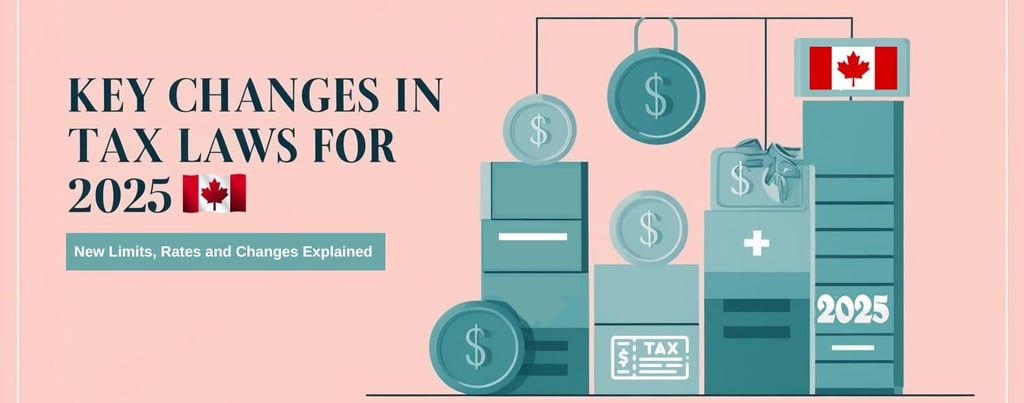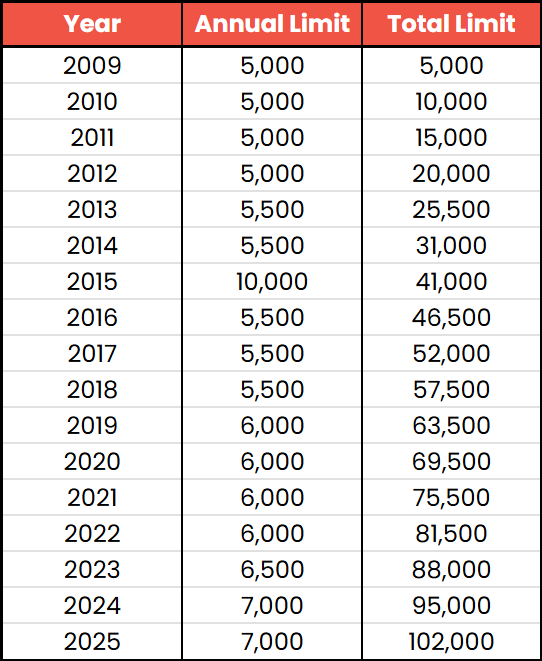Canadian Tax Updates 2025: New Limits, Rates and Changes Explained
Wondering what’s changing in Canadian taxes for 2025? From higher RRSP and TFSA contribution limits to updates on CPP rates, federal tax brackets, and capital gains rules, this comprehensive guide covers everything you need to know. Whether you're planning for retirement, buying your first home, or optimizing your investments, these tax updates can help you stay ahead. Don’t miss out on the strategies to maximize your savings and minimize your taxes this year—read on to discover the details!
Komal Kaur
1/1/20253 min read


RRSP Contribution Limit Increase
For 2025, the Registered Retirement Savings Plan (RRSP) contribution limit has increased to $32,490, up from $31,560 in 2024. This is an increase of $930 aligns with rising income levels, offering Canadians more room to save for retirement tax-efficiently.
This adjustment is particularly beneficial for high income earners, as increased income will allow them to shelter more income for immediate tax savings and long-term wealth. Be sure to calculate your contribution room and take advantage of the new limit to reduce taxable income.
TFSA Contribution Limit Increase
Unlike RRSP, The Tax-Free Savings Account (TFSA) don't provide an upfront tax deduction. However, any growth within the account is Tax-free and withdrawals are also tax-exempt.
In 2025, the annual contribution limit has been raised to $7,000, reflecting inflation adjustments.
This increase allows Canadians to grow their investments tax-free while taking advantage of compound interest. If you have unused contribution room from previous years, 2025 is a great year to catch up.
First Home Savings Account (FHSA)
A significant introduction in 2025 is the First Home Savings Account (FHSA). This new account aims to assist Canadians in saving for their first home purchase. The FHSA offers potential tax benefits and can be a pivotal tool for first-time homebuyers looking to enter the real estate market.
CPP Contribution Rate Update and CPP 2.0 Changes
The Canada Pension Plan (CPP) will undergo important changes in 2025. The contribution rate is set to rise, reflecting the government's efforts to enhance the retirement security of Canadians. Additionally, the CPP 2.0 changes aim to improve benefits for current and future retirees, ensuring a more sustainable pension plan for all Canadians.
Federal Tax Bracket Changes for 2025
In line with the increasing cost of living, Canada will be adjusting its federal tax brackets in 2025. These changes will help ensure that taxpayers are not disproportionately affected by inflation, promoting a fairer tax system. The revised brackets mean that many Canadians could see a potential decrease in their tax burden.
Basic Personal Amount Increase for 2025
The basic personal amount, which is the portion of income not subject to tax, will also see an increase in 2025. This adjustment reflects the government's commitment to providing tax relief to individuals, allowing them to keep more of their hard-earned money in their pockets. The increase in this amount is an important step towards reducing the overall tax load on lower and middle-income earners.
Proposed Capital Gains Changes for 2025
Looking towards 2025, there are proposed changes regarding capital gains taxes. These modifications seek to create a more equitable tax environment, particularly for investments in housing and other appreciating assets. As details emerge, taxpayers should stay informed on how these changes could affect their investments.
Proposed GST Updates for December 2024 - February 2025
Canada's Goods and Services Tax (GST) may undergo significant updates during late 2024 and early 2025. While specific details have yet to be confirmed, changes in GST rates or structures could impact consumers and businesses alike, making it crucial to stay updated on any announcements from the government.
Updates to the Home Buyers’ Plan (HBP)
The Home Buyers’ Plan is also set for updates in 2025. This popular program, which allows first-time homebuyers to withdraw from their RRSPs to purchase a home, will have new provisions aimed at making it more accessible. These updates are intended to help address the ongoing challenges faced by new buyers in an increasingly competitive housing market.


For those who were 18 years old in 2009, the total maximum lifetime contribution limit for them has reached $102,000 as of 2025.
